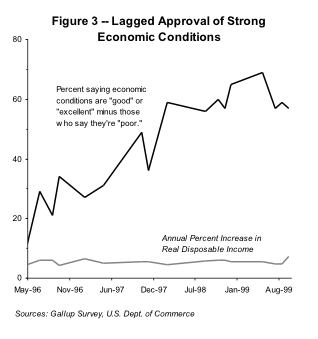In one of my excursions this summer, I met a gentleman who asked me an interesting question, but we never really had a chance to discuss the answer. So this post is my chance to try to do that. The question was, roughly:
The country seems to be running well and Obama has a solid record of accomplishment. So why isn’t he more popular?
It’s a good question with a number of moving parts, which I’ll address in turn.
First, let’s dismiss the simple answers: It’s not because of racism or polarization. Obama’s approval ratings have been very stable for most of his term, usually hovering within a few points of 45 percent. But he came into office with approval ratings near 70 percent, even though it’s hard to imagine any of the respondents not knowing his race. And the country wasn’t really much less polarized in 2009 than it is today.
(Polarization actually cuts both ways on presidential popularity. Yes, it makes it harder for Obama to win over Republicans—a large percentage of them really do see him as a threat to the nation. But it also means that it’s easier for him to have the backing of all Democrats.)
Particularly in an era of a polarized Congress and media, most legislative achievements are going to make nearly as many enemies as supporters.
Now, as for the part of the question about the country running well…. As I and many others have written, presidential popularity and national election results are strongly related to the performance of the economy. And the economy has actually been turning out fairly good numbers recently. Jobless claims are down and economic growth is surging. So why hasn’t this benefited Obama politically?
Basically, because the good news is relatively new. The American economy is still emerging from the shadow of the worst crash since the Great Depression, and the recovery up until very recently has been rather paltry. Remember, GDP growth in the first quarter of this year was actually negative. And even consistently strong growth takes a while to affect voters’ impressions of the economy and the political system.
Below is a graph I made for a paper in graduate school in 2000. (It took some digging.) It charts two trends: growth in real disposable income from 1996 to 1999, and public opinion on the economy during the same time. The economy was growing very strongly throughout this period. Real disposable income grew steadily at an annual rate of roughly 5.5 percent, never dropping below 4.3 percent. But it took years of this sustained growth for a majority of Americans to classify the economy as “good” or “excellent.” And this was roughly six years after the most recent recession had ended.

That is to say, it takes a while for people to notice that things are going well, particularly when they’ve been bad for so long.
The other part of the question above concerns Obama’s record of accomplishment. Indeed, he does have a good record. If you include health care reform, financial reform, student loan reform, passage of a massive economic stimulus that may well have prevented a depression, withdrawal from multiple wars, etc., his is probably the most accomplished Democratic presidency since Lyndon Johnson’s. So why doesn’t he get credit for that?
Because voters aren’t necessarily impressed with accomplishment. In that list of accomplishments above, very few are automatic crowd pleasers. Particularly in an era of a polarized Congress and media, most legislative achievements are going to make nearly as many enemies as supporters. Political observers often look back in awe at LBJ’s impressive accomplishments in 1964 and ’65, including Medicare, Medicaid, and landmark civil rights legislation, but how did voters reward him in the following election cycles? They punished his party in the 1966 mid-terms, and he was so unpopular by 1968 that he declined to run for re-election rather than face voters’ wrath.
So if you want to understand Obama’s relatively paltry approval ratings as of mid-2014, just note that the economy has only been functioning well very recently, and that legislative accomplishments, while important, can win as many detractors as friends. My guess is that if we see continued reasonably strong economic growth in the next year or two, we’ll see his approval ratings rise into the 50s, perhaps even the 60s. (And if the 1990s are any guide, Republicans could accelerate this process by impeaching Obama.) But for now, Obama’s approval ratings aren’t likely to shift much, and that’s something Democrats will just have to deal with as the mid-term elections approach.





